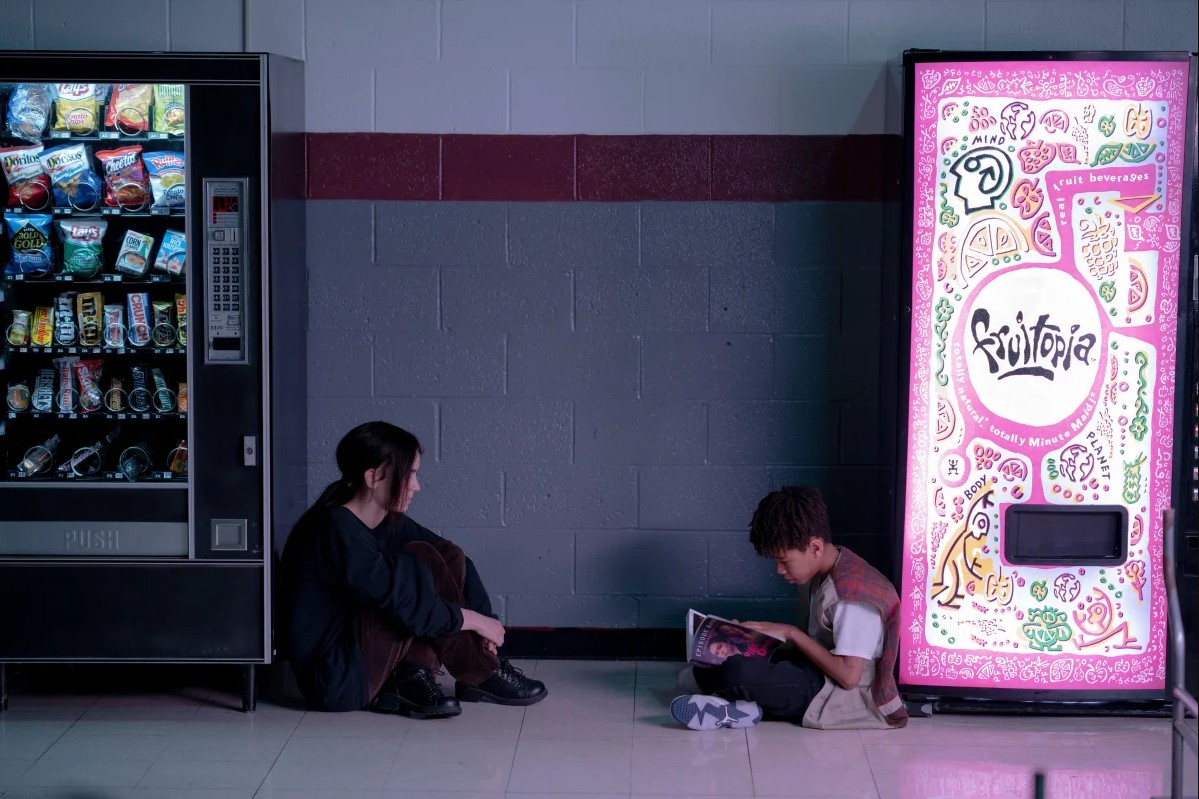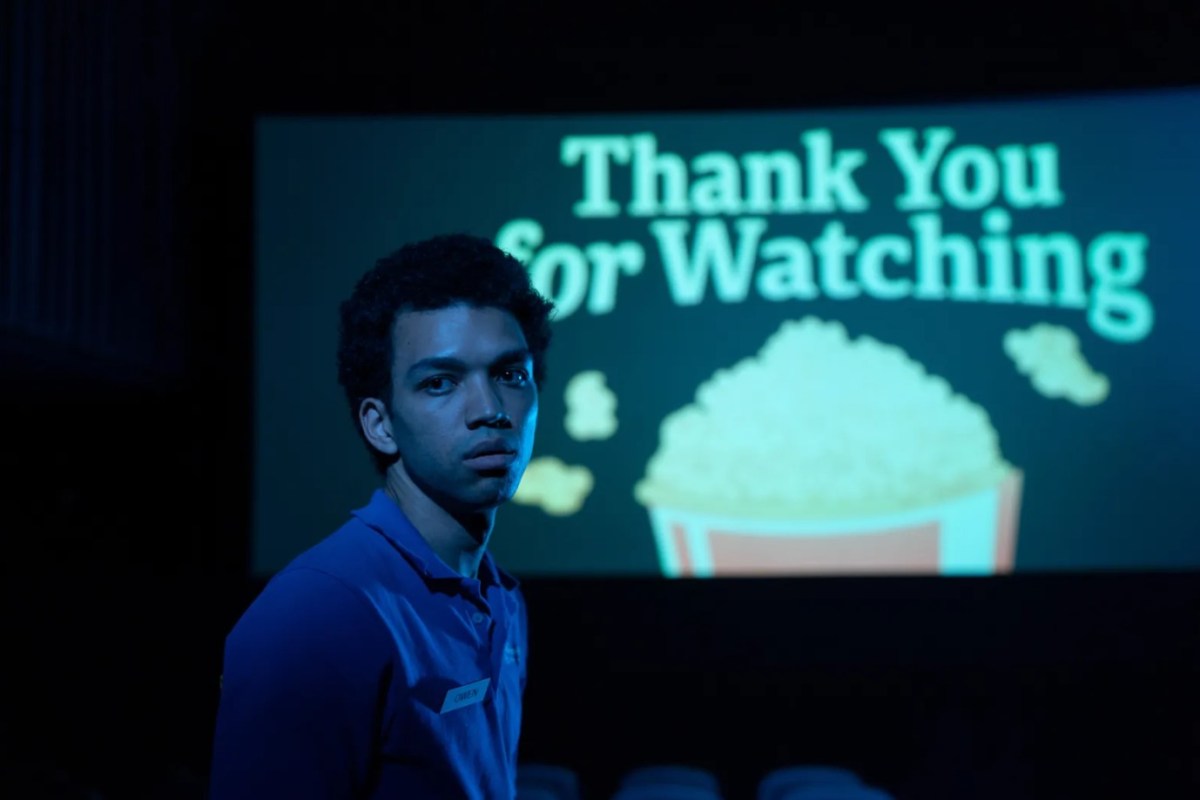Do you remember the first TV show you were obsessed with? The one you had to race home from school for, or stay up late to watch – the one that made your heart race, and your mind reel with fantastic possibilities? When that show ended, wasn’t it devastating to realise that this reliable source of escapism was no more?
Well, what if it didn’t have to end? What if the the world of that show somehow manifested itself into your reality, and you could live it out until the end of your days?
I Saw The TV Glow interrogates these parasocial relationships we have with TV, emphasising in equal parts the joys and the horrors of such obsession. It’s also a heartbreaking parable for the trans experience – more specifically, the phenomenon of seeing something you want to be but being unable to actualise it.
Non-binary filmmaker Jane Schoenbrun’s sophomore feature opens with a stirring cover of Broken Social Scene’s Anthems for a Seventeen Year-Old Girl. ‘Used to be one of the wretched ones and I liked you for that/ Now you’re all gone, got your make-up on and you’re not coming back/ Can’t you come back?’ It’s the 1990s, and 12-year-old Owen wanders under a (trans-flag coloured!) parachute dome in his high school gymnasium, evidently disconnected from his classmates.
It’s obvious Owen (played here by Ian Foreman, and later by Justice Smith) is different from his peers, and not in a quirky, chosen-one kind of way. He’s distracted, unable to relate to most kids, and there’s an unnamed feeling slowly eating away at him. Many viewers will relate. But Owen soon finds connection with a 9th grade girl named Maddy (Brigette Lundy-Paine), whom he bonds with over a shared love of a (fictional) TV show: The Pink Opaque.

The Pink Opaque is essentially Buffy: there’s the emphasis on strong female characters (in this case Tara and Isobel, the psychic teen duo), a mixture of prosthetics and early CG for its monsters of the week, and best of all: it uses the exact same font in its credits. Those that grew up with Buffy and similar shows (Charmed, Xena: Warrior Princess, etc.) will adore the nostalgia-heavy tribute. Lovingly crafted with attention to things like 90s tape grain, crocheted fashions, and awkward dialogue, The Pink Opaque is easy to fall in love with.
‘Do you like boys or girls?’ asks Maddy.
‘I .. .I think I like TV’, replies Owen.
The show’s addictive nature is intentional: it’s the perfect program to lose yourself in and forget the troubles of the world around you. For Owen, who is so scared be anything or anyone that he concludes he must be ’empty inside’, the world of The Pink Opaque is a wonderful drug.
Initially Owen is deemed ‘too young’ for The Pink Opaque, which is the last show in the Young Adult Network’s night program (it’s on at 10.30pm). In the brief window between childhood and adulthood, he is repeatedly told by his mother that it’s not appropriate. Ah, but he manages to watch it with some help from his renegade, CRT-worshipping friend Maddy, who records it on VHS tapes for him and leaves them in the dark room at school.
As their friendship grows, Maddy clearly sees something in Owen that he’s not ready to admit to himself yet. But like Owen, she lacks the vocabulary and wisdom to name it. Her unhealthy obsession with The Pink Opaque grows at a much faster rate, and leads to a defining incident in Owen’s life (one which also forms the central mystery of the film).
Then, in the blink of an eye, Owen’s graduating high school, and is now deemed too old for it – now The Pink Opaque is a ‘kid’s show’, a juvenile half hour fantasy program that would be silly for an 18 year old to watch. This arc captures precisely that oh-so-frustrating feeling of not being able to enjoy something guilt-free.
A24 is marketing I Saw The TV Glow as a horror, but there aren’t any jump scares or blood-curdling screams. It would be better described as an ‘existential dread piece’, or even ‘a goddamned tear-jerker’.
Tragedy abounds in I Saw The TV Glow. Clear themes like the rushed coming-of-age, the loss of innocence, and the dangers of media-worship abound, but the most tragic of them all is the denial of one’s true self. Owen expounds so much energy repressing his heart’s true desires that he loses his sense of self entirely.
‘Usually as characters get older, they become more sure of themselves. This character becomes less,’ Justice Smith told WJTV.
For all the trans joy being celebrated in the world today, it may be easy to forget the pain that often comes with coming out as trans – or in the case of I Saw The TV Glow, the pain of never coming out at all, and having the repression nearly eat you alive.

Nevertheless, for a deeply traumatic film, it had so many moments that made me want to rise out of my seat and scream ‘fuck yes!’. In particular, the second act scene where the characters go to a dark bar on the outskirts of town to talk, and there’s a band comprised of recognisable modern-day musicians like Phoebe Bridgers playing an original song.
Just as in an episode of Buffy, the bar is a sacred space for our protagonists to plan their next move, and also a meta-space where a real-life band can showcase their tunes.
Schoenbrun’s film is also uber-stylish, crafted with clear vision and a dream-like pink and purple aesthetic that’s enhanced by a nostalgic, indie-rock soundtrack. It’ll draw you in, body and soul, letting you drift along its stream before it absolutely tears you apart.
I adored this film, and I’m going to watch it again as soon as possible.
I Saw The TV Glow is currently playing at the Melbourne International Film Festival. It will have a general cinema release from 29 August.
Actors:
Justice Smith, Brigette Lundy-Paine
Director:
Jane Schoenbrun
Format: Movie
Country: USA
Release: 29 August 2024





